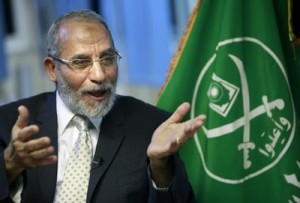 Egypt’s new military rulers have arrested the Muslim Brotherhood’s supreme leader, security sources say, and issued warrants for up to 300 other members hours after ousting the elected president, Mohamed Morsi, and taking him and his aides into military custody.
Egypt’s new military rulers have arrested the Muslim Brotherhood’s supreme leader, security sources say, and issued warrants for up to 300 other members hours after ousting the elected president, Mohamed Morsi, and taking him and his aides into military custody.
The day after a momentous night in Cairo has revealed the full extent of the military overthrow, with key support bases of the Muslim Brotherhood, including television stations, closed down or raided.
Security officials told the Associated Press and Reuters that the Brotherhood’s supreme leader, Mohammed Badie, was arrested in a coastal city near the Libyan border on Wednesday and flown to Cairo in a military helicopter.
The Brotherhood spokesman Gehad el-Haddad said he could not confirm the reports because the group had lost their lines of communication to Badie.
Prosecutors said on Thursday morning they were seeking Badie’s arrest and that of his deputy, Khairat el-Shater, for inciting violence against protesters outside the Brotherhood’s headquarters in Cairo on Sunday night, when eight protesters were killed.
The dramatic events of the last day have been welcomed by many in the capital, where most state institutions, including the security establishment, had steadily abandoned Morsi since Sunday.
Adli Mansour, the head of the constitutional court, was sworn in as interim head of state on Thursday. In his first remarks as leader, he praised the protests that preceded Morsi’s removal and said they had “corrected the path of the glorious revolution” that brought down the former dictator Hosni Mubarak in February 2011.
“I look forward to parliamentary and presidential elections held with the genuine and authentic will of the people,” Mansour said in a televised address.
The epicentre of the latest revolt, Tahrir Square, was teeming with up to one million revellers until well past midnight. The crowds were reportedly the largest the square had seen at any point since the first stirrings of revolution in 2011, spilling over two bridges across the Nile and into the west of the city.
Elsewhere in Egypt, where backing for the Brotherhood had remained solid despite Morsi’s political tribulations, the reaction to his ousting has been far from celebratory. Up to 10 people died in clashes, and more than 400 were reported wounded, in the hours following the military chief Abdul Fattah al-Sisi’s announcement that he had ended Morsi’s presidency. Rallies are expected in many parts of the country throughout Thursday and are likely to be met by a prominent military presence.
The international response to the coup has so far been muted. Barack Obama is expected to make a statement at some time on Thursday. The US president had been supportive of the democratic ballot that elected Morsi in June 2012. Arab world leaders are understood to be considering how to deal with yet another seismic shift in the political landscape at a time of profound and ongoing regional instability.
The strongest response was from Turkey’s government, which like Egypt’s Muslim Brotherhood has Islamist roots. The foreign minister, Ahmet Davutoğlu, said the overthrow of Morsi was a military coup and unacceptable. The Tunisian ruling party Ennahda condemned a “coup against legitimacy”.
The coming days are likely to prove crucial across Egypt, as the military strives to assert itself in a transition it will guide, with nominal civilian leadership, towards new parliamentary and presidential elections.
The Muslim Brotherhood will also find itself under pressure to react to the ignominious ousting of its chief patron, and the man who guided it to political legitimacy eight decades after the group’s inception throughout the rule of the former president Hosni Mubarak when it remained outlawed.
Muslim Brotherhood leaders have pledged to conduct peaceful protests in response to Morsi’s ousting. However, before the coup two of the former president’s aides said no political leader could control the anger of the people.
“In the space of one night we are back 60 years,” said Amr Darrag, a senior Muslim Brotherhood member and former minister for international co-operation. “All of our leaders are being arrested in the middle of the night. Their houses are being stormed. Their children are being scared. All of our remaining leaders are banned from travel and this is just the start.
“Yesterday we were part of the government doing what we thought was best for Egypt. Even if you don’t agree with us, this has gone too far.”
Mansour’s installation as interim of head of state caps a rapid rise for the head of the supreme constitutional court, who was appointed chief justice only on Sunday – timing that coincided with the first day of mass protests against Morsi.
Egypt’s civilian opposition as well as senior Muslim and Christian leaders are likely to play prominent roles in a transition period. The military has cast itself as a reluctant overlord and has not yet specified how long it will remain in effective control.
Wednesday’s coup followed several weeks of attempts by Morsi to reach out to opposition groups. The ousted leader’s aides insist he had been prepared to enter into power-sharing arrangements, but had been rebuffed at every turn.
The Guardian

Leave a Reply
You must be logged in to post a comment.